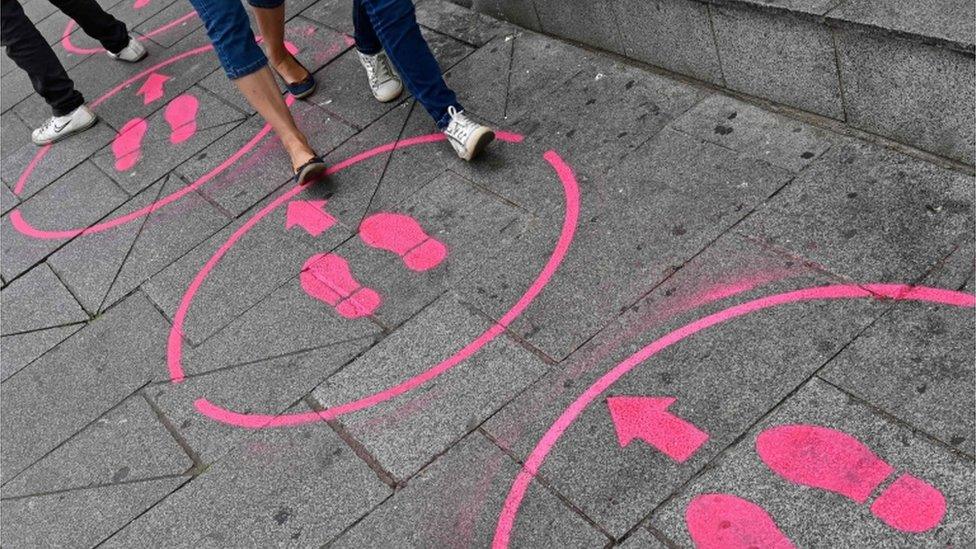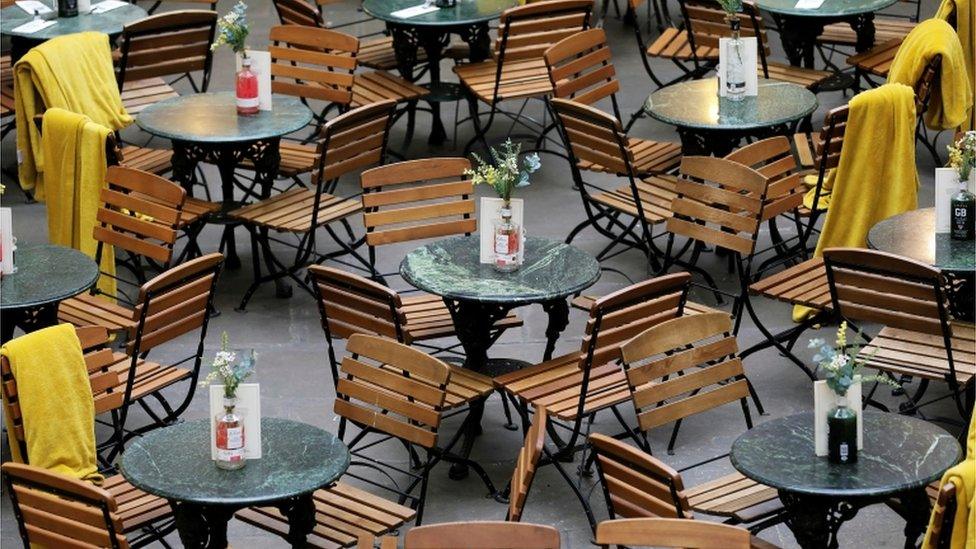Coronavirus in Scotland: Warning against cutting 2m distance rule
- Published

Several countries have already introduced different rules on how far you should keep apart from other people
Scotland's chief medical officer has warned against changing the current rules on keeping a 2m (6ft) distance from other people.
Several countries have already reduced the distance that people must keep apart to as little as 1m.
Scotland's tourism sector has predicted that tens of thousands of jobs could be lost unless the 2m rule changes.
But Dr Gregor Smith said relaxing the social distancing rule would increase the risk of the virus spreading.
And he insisted that the current rules were "balanced and sensible" and were based on the best available scientific evidence.
The official guidance from the World Health Organisation is for people to "maintain at least one metre (3 feet) distance between yourself and others".
This had led countries including China, France and Denmark to insist that people only keep 1m apart.
Other countries including Australia, Germany and Italy have a 1.5 metre rule, while in the US it is 1.8 metres.
But the UK, Canada and Spain continue to insist that people keep 2m apart, despite fears that it will make it much harder for bars, restaurants, small shops and many other businesses to reopen.
Both the UK and Scottish governments have previously said the rules were being kept under review, and could be changed if it was thought to be safe to do so.

1m distancing rule - China, Denmark, France, Hong Kong, Lithuania, Singapore
1.4m - South Korea
1.5m - Australia, Belgium, Germany, Greece, Italy, Netherlands, Portugal
1.8m - US
2m - Canada, Spain, UK

Dr Smith told the Scottish Parliament's Covid-19 committee that there was "incontrovertible" evidence that the risk of transmitting the virus increased the closer you got to someone.
He said: "If you have physical contact with someone, your risk is much greater than if you are at 1m - and if you are at 1m, your risk is much greater than if you are at 2m.
"So the advice from the UK advisory groups has been that the best balance to provide the adequate levels of safety and reduce transmission between people is that the UK should adopt the 2m distance rule.
"I think that this is a balanced and sensible precaution to make sure that we are reducing the risk of the transmission between people."

Dr Smith said he believes the current rules are necessary to protect people's health
Dr Smith said that reducing the distance would also reduce the amount of time that people could spend within that distance without "increasing the possibility of being able to transmit the virus".
He also stressed that the evidence suggested that Covid-19 was probably more transmissible than flu.
He added: "It is a virus which is particularly highly transmissible because so few of us have ever come into contact with it.
"My view is that if we were to reduce that 2m distance that we have just now, then there would be a much greater risk of the virus transmitting between more people at this point in time."

Many bars and restaurants say they will not be able to reopen under the current social distancing rules
However, he said that his advice was purely on the public health risk of reducing the social distance rules.
And he said government ministers would also have to weigh up "the wider harms to society and the economy" of the virus.
Tourism Secretary Fergus Ewing told the Scottish Parliament on Wednesday that tourism and hospitality businesses were likely to reopen on 15 July if progress in suppressing the coronavirus continues.
But the Scottish Tourism Alliance warned last week that many of its members would not be able to reopen until the current 2m rule was reduced.
In a letter to the Scottish government, it said: "The majority believe that it will not be economically viable to do so at 2m and as a result would have to close until such time as there was a change to the distancing measures.
"Many may not be able to hold out until then and the difference could mean many tens of thousands of jobs being saved or lost.

A SIMPLE GUIDE: How do I protect myself?
IMPACT: What the virus does to the body
RECOVERY: How long does it take?
LOCKDOWN: How can we lift restrictions?
ENDGAME: How do we get out of this mess?
